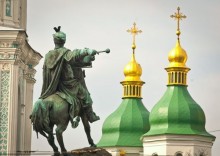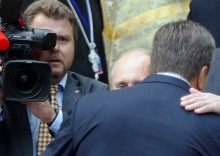Viktor Yanukovych has a unique chance today. If prince Volodymyr the Great once joined Kyivan Rus’ (Ukraine) to Europe by christening it, the current president has an opportunity to do this through signing the Association Agreement with the European Union and further integration into the European structures. In order to demonstrate a real alternative, the Ukrainian opposition must try really hard and abandon verbal battles.
The celebration of the 1,025th anniversary of the Baptism of Kyivan Rus’ became another test of Ukraine’s European integration aspirations. And in particular, it was its political compound, which dominated throughout the course of the whole event. All our experts were unanimous in saying that this expensive celebration did not become a historical and spiritual incentive for reinterpreting of Kyivan Rus’ past for the modern Ukraine. Instead, we again heard statements by the Russian president Vladimir Putin and Moscow Patriarch Kirill about common values and a unified nation.
The behavior of the Russian president was a very revealing signal this time. He was 50 minutes late to the meeting with Yanukovych, and after talking to him for only 15 minutes, he left to take part in Viktor Medvedchuk’s roundtable conference. This event, which was not advertised in advance, was organized by the movement “The Ukrainian Choice,” led by Medvedchuk. The conference was called “Orthodox Slavic values as a foundation of Ukraine’s civilizational choice.” At the conference Putin talked about a single nation again and campaigned for the “integration processes among the former Soviet Union countries.”
“Putin stresses that he visits Ukraine as a pilgrim,” said the Party of Regions MP Hanna Herman to The Day. “I think that there is a spiritual component in this position of his, not a political one. And this is right. It is his choice, his position, and we are very happy that he will visit Ukraine, the land where Christianity in Kyivan Rus’ began.” It turned out to be a nice “pilgrimage” with propaganda of the Customs Union.
Another peculiarity was hard to miss. Despite the predictable propaganda of the Russian leader (he and Yanukovych celebrated the Days of Ukrainian Fleet and Russian Navy in Sevastopol), his external image in Ukraine appeared in an absolutely different perspective. Putin looked what he really was: without properly angled cameras, servile politicians, and other compounds which form the “Russian image of the ruler.” Putin’s notorious charisma did not shine in Ukraine because we do not have the autocratic entourage here.
We discussed relations between Ukraine and Russia after the celebration of the Kyivan Rus’ Christening with Oleksandr SUSHKO, director of the Institute for Euro-Atlantic Cooperation.
It is clear that despite the official pretext, the celebration of the christening anniversary, Putin’s visit to Ukraine was of political nature as well. What can you say about the results of the visit?
“The results of the visit show the Russian president’s readiness to play a fairly complicated, bold-faced political game, not typical for relations between two sovereign states. His main goal was the demonstration of dissatisfaction with Ukraine’s actions in foreign policy, the preference of European integration. In particular, Russia’s leader showed his readiness to directly support other political leaders in case the president of Ukraine will not listen to his arguments. This is not about hints anymore. Putin publicly demonstrated the way in which Russia would act in Ukraine in case Kyiv does not react positively to persistent proposals about integration into the Customs Union; and this was just the tip of the iceberg. This is the top task on the agenda of Russian policy towards Ukraine. Other issues are of clearly subordinate nature.
“The situation will not change until Ukrainian side makes a decisive step, in one direction or another, otherwise, it will be necessary to revise the tools of influence.
“Of course, such tactic is not typical for bilateral relations between countries that respect each other. Besides, this does not add respect to the Ukrainian leaders, who not only allowed the leader of a neighboring country to feel like the most important person during the celebrations on Ukraine’s territory, but also let him demonstrate his disrespect towards the country and its leaders. Putin dedicated most of his time in Kyiv not to official negotiations, but to meetings with those who are considered to be the stronghold of Russia in Ukraine, despite their very low trust rating.”
It sounds like you are talking about Viktor Medvedchuk. Considering the support of such personalities, can it be said that Russia understands the Ukrainian context?
“As for Medvedchuk, it is not about support, it is rather about cultivation. His ‘Ukrainian Choice’ is one of the key projects supported by Russia in all possible ways, it is supported as none of them were before. Suffice it to remember last summer, when Putin cut his meeting with Yanukovych and paid a personal visit to Medvedchuk in the Crimea. The same happened this year.
“I think that all the actions related to active promotion show that Medvedchuk does not stand as an independent political figure. He is rather an interpreter who articulates Putin’s views on certain issues in Ukraine.
“It is also clear that political support of Medvedchuk as a presidential candidate is also viewed as one of the possible options, but it is unlikely that this card will be played. Everyone realizes that chances of him being chosen in free elections are close to zero. At the moment, he performs a different mission, he is one of public leaders who must consolidate dispersed pro-Russian groups in Ukraine. ‘The Ukrainian Choice’ must not just give them a push towards consolidation, but provide them with a clear action plan and a vision of future. These groups’ activities will be aimed at showing that Ukrainian society has a large Russia-oriented segment. Though, of course, this is not true.”
How effective can this model of interaction between Russia and Ukraine be?
“Russia is trying to master those models of influence on Ukrainian situation which have been underestimated and ignored before. To be precise, these are actions through the institute of civil society. For a long time, this field has been a prerogative of Europe-oriented organizations and those citizens who support European choice. Thus, being a public activist in Ukraine was equal to being oriented towards Europe. A newly created pro-Russian organization is committed to destroy this stereotype and demonstrate that our civil society is as shattered and dissimilar as Ukrainian society on the whole.
“The new thing about this situation is that the importance of work in the public sector was realized. And if marginalized groups, branches of Russian organizations in Ukraine, or Crimean separatist organizations used to be engaged in this, now we see that it is done on the nationwide scale.”
What are the chances of this project’s success?
“Assuming that success is the demonstration of the presence of a group of Russia-oriented activists in the Ukrainian society, whose opinion and activity the Kremlin will use as a foundation while strengthening its position in a dialog with Kyiv, success is possible. We already see that in ‘information wars’ the fact of ‘The Ukrainian Choice’s’ existence is already used by Russian pro-governmental media. For example, they were present at a public event held by Medvedchuk in Brussels. This event was broadcasted as the manifestation of Ukrainian citizens’ activism, even though it featured only a few dozen people.
“It would be extremely naive to talk about a bigger success and unification of wide public circles around the offered slogans and goals. More than 20 years of Ukrainian civil society’s experience show that pro-Russian movements enjoy no demand on the national level. The reason of it is that bearers of such views, leaders of organizations fail to conceal their contemptuous attitude towards Ukraine. This deprives such groups of nationwide perspective, leaving them in regional and social niches in the east and south. Such people are not able to offer a nationwide program that would unite the general public in this country.
“The biggest challenge that Medvedchuk and others like him face in order to make the project successful, is gathering a decent amount of reputable people who really care for Ukraine’s problems. The people Medvedchuk is leaning on protect Russia’s interests and do not even care to conceal it. They treat the very fact of Ukraine’s independence as some silly incident, a temporary misunderstanding that needs to be fixed. That is why Medvedchuk’s program is going to exist only while it is strongly demanded by Russia. There is no such demand from Ukrainian society.”
What is the tactic of Ukrainian government in the context of relations with Russia?
“The Ukrainian government is reaping the benefits of the nature of relations that were created after 2010. These are relations of very unequal partners. Can we imagine a situation when the president of Ukraine arrives to Russia, and instead of meeting the country leaders, he attends a meeting with Ukrainian civil activists, who criticize the leader of the Russian Federation. This is an unrealistic scenario. So we see how far this game reaches into strategic partnership, provided that neither side believes in it and only tries to use the other side in order to achieve its goals. For Ukraine it is energy supply at reduced cost, and for Russia it is involvement of Ukraine into its integration projects and acquisition of our country’s material resources, especially those in energy and transport spheres. These are the real goals of both parties, and they do not care about deeper interaction of countries.”
***
The behavior of Ukraine’s leaders during the baptism festivities was rather peculiar. It shows that there is a fight going on for the historical succession of Kyivan Rus’. The highest officials have spoken about “the celebration of our statehood,” “Ukraine-Rus’,” “European identity,” etc. on the eve of the event. As The Day’s editor-in-chief Larysa Ivshyna wrote on her Facebook page, it is remarkable that even the president himself made a slip of the tongue which claims to be his best ever. While talking about the crucial historical fact of the Christianization of Kyivan Rus’, Yanukovych called it “Ukrainian Rus’.” Even in this way, it might be a rather clear signal of the progressive part of Ukrainian society to the Kremlin, since historical consecution “Kyivan Rus’ – Rus’-Ukraine – Ukraine” is a fact that leaves no alternative.








